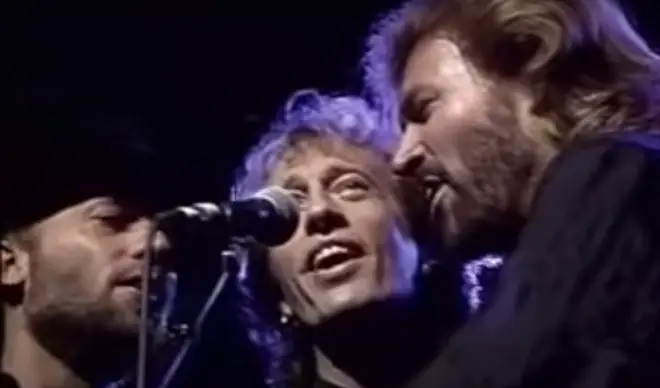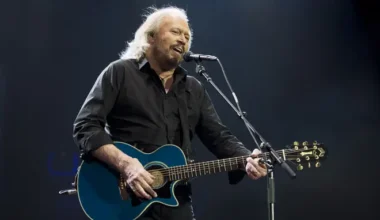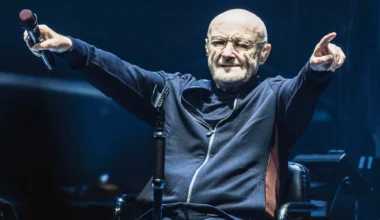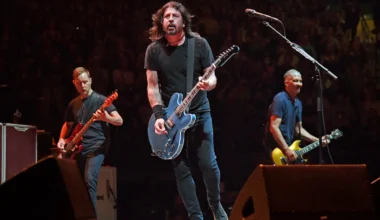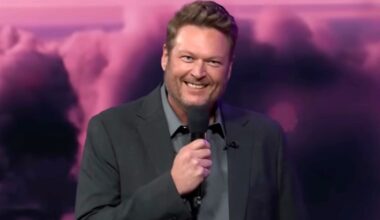It was supposed to be just another soundcheck. No audience. No spotlight. Just a quiet pre-show routine at Auckland’s Western Springs Stadium in March 1999, where the Bee Gees were preparing for their global One Night Only tour. But in that private space, something deeply human and profoundly emotional happened—something no one expected.
Maurice Gibb, the often-reserved heartbeat of the Bee Gees, stood by the mic as the band ran through a technical rehearsal. Suddenly, the unmistakable backing track of “(Our Love) Don’t Throw It All Away”—a song forever associated with his late younger brother, Andy Gibb—began to play.
The group wasn’t rehearsing vocals that day.
But Maurice couldn’t help himself.
He started to sing.
His voice was quiet, tender, almost trembling. He wasn’t performing. He was remembering. And someone nearby, perhaps a crew member or technician, happened to have a camera rolling.
That clip—raw, unpolished, and painfully honest—would later find its way online. And for fans of the Bee Gees, it’s become one of the most treasured, and devastating, moments ever captured.
A Moment That Wasn’t for Us—But Reached All of Us
Andy Gibb was the youngest of the Gibb siblings. A star in his own right, Andy burned bright in the late ’70s with hits like “Shadow Dancing” and “I Just Want to Be Your Everything.” But behind the fame was a young man battling demons—drug addiction, heartbreak, and the crushing weight of expectations. He died in 1988 at the age of 30, leaving his brothers—and millions of fans—grieving a life cut painfully short.
By 1999, more than a decade had passed. But for Maurice, it clearly hadn’t faded.
“(Our Love) Don’t Throw It All Away” wasn’t just a song. It was a shared memory. A connection to Andy. A fragment of a voice they could no longer speak to in person, but could still hear in the music.
As Maurice sang into the empty stadium, you can hear the ache in every note. He wasn’t trying to impress. He wasn’t trying to relive glory. He was simply… mourning.
And in doing so, he gave fans something more powerful than any concert performance: a glimpse into the real love behind the legacy.
The Performance That Followed—and the Moment That Lingers
Later that year, during the official One Night Only concert, the Bee Gees performed the song properly. Barry, Robin, and Maurice sang in harmony while Andy’s voice played from the original recording. A montage of their late brother played on the screen behind them, and the crowd at Las Vegas’s MGM Grand wept openly. It was a moment of closure. Of tribute. Of brotherhood.
But ask longtime Bee Gees fans what moment they return to—and many will point to that rough backstage video of Maurice, singing alone to a ghost.
“It Wasn’t for the Stage. It Was for Andy.”
The comments under the video say it all:
“This isn’t a performance. This is grief in real time.”
“I cry every time I watch this. You can feel how much Maurice misses him.”
“This clip means more to me than any polished tribute. It’s real.”
That’s the thing about music. Its most powerful moments often happen when no one is watching—when a brother sings not to an arena, but to someone he’ll never get back.
Maurice Gibb passed away just a few years later in 2003. Today, only Barry remains. But through videos like this—through unguarded moments of heartbreak and harmony—the Gibb brothers live on.
They weren’t just singers.
They were family.
And sometimes, in the quietest moments, that’s when their music speaks the loudest.
🎥 Watch the rare, behind-the-scenes video below. But be warned: it’s not just a song. It’s a goodbye you can feel.
